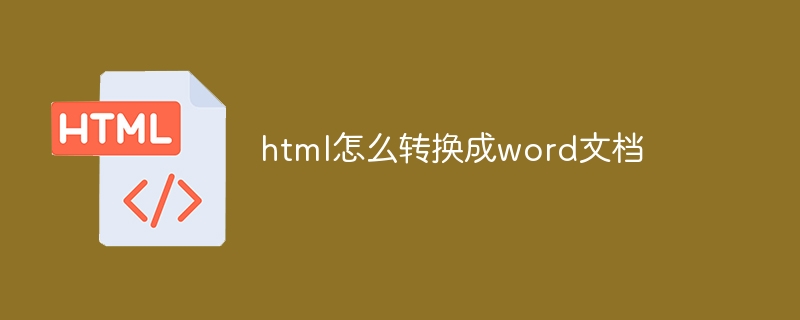How to convert HTML to Word document

HTML is a web markup language, and Word is a word processing software. The two have different file formats. Due to the diversity of needs and the development of technology, there are currently many ways to convert HTML to Word documents. This article will introduce one of the commonly used methods and provide specific code examples.
To convert HTML to Word documents, you can use open source libraries or tools, such as Pandoc, python-docx or phpword. The following uses python-docx as an example to demonstrate the process for you.
First, make sure that Python and the python-docx library are installed on your computer. Then, follow these steps:
- Create a new Python file named "html_to_word.py".
- Import the required libraries:
from docx import Document from bs4 import BeautifulSoup import requests
- Define a function to convert HTML files to Word documents:
def html_to_word(html_file, table_of_contents=False):
# 创建一个新的Word文档
doc = Document()
# 读取HTML文件内容
with open(html_file, 'r') as f:
html = f.read()
# 使用BeautifulSoup解析HTML
soup = BeautifulSoup(html, 'html.parser')
# 获取HTML中的所有段落
paragraphs = soup.find_all('p')
# 将每个段落写入Word文档
for p in paragraphs:
doc.add_paragraph(p.text)
# 如果需要生成目录,添加目录到Word文档
if table_of_contents:
doc.add_page_break()
doc.add_heading('Table of Contents', level=1)
# 获取HTML中的所有标题
headings = soup.find_all(re.compile('^h[1-6]$'))
# 将标题写入Word文档的目录
for h in headings:
doc.add_paragraph(h.text, 'TOCHeading%d' % (int(h.name[1])))
# 保存Word文档
doc.save('output.docx')
print("转换完成!")
# 调用函数进行转换
html_to_word('input.html', table_of_contents=True)- Name the HTML file that needs to be converted as "input.html" and place it in the same directory as "html_to_word.py".
- Open a terminal or command prompt and enter the directory where "html_to_word.py" is located.
- Run the command
python html_to_word.pyand wait for the program to complete execution.
After performing the above steps, a Word document named "output.docx" will be generated, which contains the paragraphs and (if set) table of contents in the HTML file.
It should be noted that this is just one method of converting HTML to Word. Depending on different needs and technology stacks, other tools or libraries can also be used. In addition, during actual use, it may be necessary to make appropriate adjustments and optimizations based on the specific HTML structure and style.
To summarize, using the python-docx library can easily convert HTML files into Word documents. By parsing the HTML and extracting its content, then adding it to the Word document one by one, and finally saving it in Word format. The code sample provided above can be used as a starting point to help you with HTML to Word conversion.
The above is the detailed content of How to convert HTML to Word document. For more information, please follow other related articles on the PHP Chinese website!

Hot AI Tools

Undresser.AI Undress
AI-powered app for creating realistic nude photos

AI Clothes Remover
Online AI tool for removing clothes from photos.

Undress AI Tool
Undress images for free

Clothoff.io
AI clothes remover

AI Hentai Generator
Generate AI Hentai for free.

Hot Article

Hot Tools

Notepad++7.3.1
Easy-to-use and free code editor

SublimeText3 Chinese version
Chinese version, very easy to use

Zend Studio 13.0.1
Powerful PHP integrated development environment

Dreamweaver CS6
Visual web development tools

SublimeText3 Mac version
God-level code editing software (SublimeText3)

Hot Topics
 1378
1378
 52
52
 What is the purpose of the <progress> element?
Mar 21, 2025 pm 12:34 PM
What is the purpose of the <progress> element?
Mar 21, 2025 pm 12:34 PM
The article discusses the HTML <progress> element, its purpose, styling, and differences from the <meter> element. The main focus is on using <progress> for task completion and <meter> for stati
 What is the purpose of the <datalist> element?
Mar 21, 2025 pm 12:33 PM
What is the purpose of the <datalist> element?
Mar 21, 2025 pm 12:33 PM
The article discusses the HTML <datalist> element, which enhances forms by providing autocomplete suggestions, improving user experience and reducing errors.Character count: 159
 What are the best practices for cross-browser compatibility in HTML5?
Mar 17, 2025 pm 12:20 PM
What are the best practices for cross-browser compatibility in HTML5?
Mar 17, 2025 pm 12:20 PM
Article discusses best practices for ensuring HTML5 cross-browser compatibility, focusing on feature detection, progressive enhancement, and testing methods.
 How do I use HTML5 form validation attributes to validate user input?
Mar 17, 2025 pm 12:27 PM
How do I use HTML5 form validation attributes to validate user input?
Mar 17, 2025 pm 12:27 PM
The article discusses using HTML5 form validation attributes like required, pattern, min, max, and length limits to validate user input directly in the browser.
 What is the purpose of the <meter> element?
Mar 21, 2025 pm 12:35 PM
What is the purpose of the <meter> element?
Mar 21, 2025 pm 12:35 PM
The article discusses the HTML <meter> element, used for displaying scalar or fractional values within a range, and its common applications in web development. It differentiates <meter> from <progress> and ex
 What is the viewport meta tag? Why is it important for responsive design?
Mar 20, 2025 pm 05:56 PM
What is the viewport meta tag? Why is it important for responsive design?
Mar 20, 2025 pm 05:56 PM
The article discusses the viewport meta tag, essential for responsive web design on mobile devices. It explains how proper use ensures optimal content scaling and user interaction, while misuse can lead to design and accessibility issues.
 What is the purpose of the <iframe> tag? What are the security considerations when using it?
Mar 20, 2025 pm 06:05 PM
What is the purpose of the <iframe> tag? What are the security considerations when using it?
Mar 20, 2025 pm 06:05 PM
The article discusses the <iframe> tag's purpose in embedding external content into webpages, its common uses, security risks, and alternatives like object tags and APIs.
 Gitee Pages static website deployment failed: How to troubleshoot and resolve single file 404 errors?
Apr 04, 2025 pm 11:54 PM
Gitee Pages static website deployment failed: How to troubleshoot and resolve single file 404 errors?
Apr 04, 2025 pm 11:54 PM
GiteePages static website deployment failed: 404 error troubleshooting and resolution when using Gitee...




